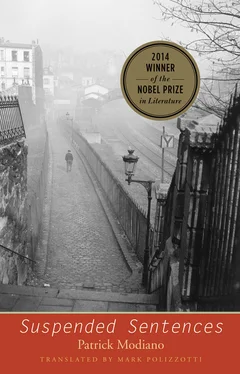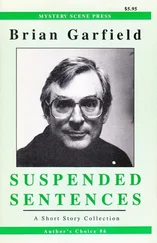Pagnon had been involved in a smuggling case that the police report called “the Biarritz stockings affair.” It concerned a large quantity of socks that Pagnon collected from various black marketeers in the area. He bundled them in packs of a dozen and dropped them off near the Bayonne train station. They had filled six boxcars with them. In the deserted Paris of the Occupation years, Pagnon drove a fancy car, owned a racehorse, lived in a luxurious furnished apartment on Rue des Belles-Feuilles, and had the wife of a marquis for a mistress. With her, he frequented the riding club in Neuilly, Barbizon, the Fruit Défendu restaurant in Bougival … When had my father met Pagnon? At the time of the Biarritz stockings affair? Who can say? One afternoon in 1939, in the seventeenth arrondissement, my father had stopped at a garage to have a tire changed on his Ford, and there was Pagnon. They had chatted awhile; maybe Pagnon had asked him for a favor or some advice. They’d gone off to have a drink at a nearby café with Henri and Edmond Delahaye … One meets the strangest people in one’s life.
I had hung around the Porte des Lilas, hoping there was still someone who remembered a Simca dealer who’d lived near there around 1939. A certain Henri. But no, it didn’t ring any bells for anyone. In Aubervilliers, on Avenue Jean-Jaurès, the Savary repair shop that had employed Edmond Delahaye was long gone. And the garage in the seventeenth arrondissement where Pagnon worked? If I managed to track it down, an old mechanic might tell me about Pagnon and — I hoped — my father. And I would finally know everything I needed to know, everything my father knew.
I had drawn up a list of garages in the seventeenth, preferably those located at the edge of the arrondissement. I had an intuition that Pagnon had worked in one of these:
Garage des Réservoirs
Société Ancienne du Garage-Auto-Star
Van Zon
Vicar and Co.
Villa de l’Auto
Garage Côte d’Azur
Garage Caroline
Champerret-Marly-Automobiles
Cristal Garage
De Korsak
Eden Garage
L’Etoile du Nord
Auto-Sport Garage
Garage Franco-Américain
S.O.C.O.V.A.
Majestic Automobiles
Garage des Villas
Auto-Lux
Garage Saint-Pierre
Garage de la Comète
Garage Bleu
Matford-Automobiles
Diak
Garage du Bois des Caures
As Garage
Dixmude-Palace-Auto
Buffalo-Transports
Duvivier (R) S.A.R.L.
Autos-Remises
Lancien Frère
Garage aux Docks de la Jonquière
Today, I tell myself that the garage where Annie brought me and my brother must be on that list. Perhaps it was the same as Pagnon’s. I can still see the leaves on the trees lining the sidewalks, the wide tan pedimented façade … They tore it down with the others, and all those years have become, for me, nothing but a long and vain search for a lost garage.
Annie took me to another area of Paris that I later had no trouble recognizing: Avenue Junot, in Montmartre. She parked the 4CV in front of a small white building with a glass-paneled door made of cast iron. She told me to wait. She wouldn’t be long. She went into the building.
I walked down the avenue. Perhaps the liking I’ve always had for that neighborhood comes from then. A sharply vertical flight of steps led to another street below, and I had fun going down it. I walked for a few yards on Rue Caulaincourt, but I never strayed too far. I went back up the steps quickly, afraid that Annie would drive away in her 4CV and leave me behind.
But she wasn’t there yet and I had to wait some more, the way we used to wait in the garage, when the orange shade was drawn behind the window of Buck Danny’s office. She came out of the building with Roger Vincent. He smiled at me. He pretended to be running into me by chance.
“Well, what do you know … Fancy meeting you here!”
For days afterward, he would say to Andrée K., Jean D., or Little Hélène:
“It’s funny … I ran into Patoche in Montmartre … I wonder what he could have been doing there …”
And he turned to me:
“Don’t breathe a word. The less you say, the better.”
On Avenue Junot, Annie kissed him. She called him “Roger Vincent” and used the formal vous , but she kissed him.
“Someday I’ll have you up to my place,” Roger Vincent said to me. “I live here.”
And he pointed to the cast-iron front door of the small white building.
The three of us strolled along the sidewalk. His American car wasn’t parked in front of his building and I asked him why.
“I keep it in the garage across the way.”
We walked past the Hôtel Alsina, near the flight of steps. One time, Annie said:
“That’s where I lived, at first, with Little Hélène and Mathilde … You should have seen the face Mathilde used to make …”
Roger Vincent smiled. And I, without realizing it, absorbed everything they said and their words were etched in my memory.
Much later, I married and lived in that neighborhood for a few years. Almost every day I walked up Avenue Junot. One afternoon, something just came over me: I pushed open the glass-paneled door of the white building. I rang at the concierge’s lodge. A red-haired man stuck his head through the opening.
“Can I help you?”
“I’m looking for someone who lived in this building, about twenty years ago …”
“Oh, well, I wasn’t here then, Monsieur.”
“You wouldn’t happen to know how I might get some information about him?”
“Go ask at the garage across the street. They used to know everybody.”
But I didn’t go ask at the garage across the street. I had spent so many years looking for garages in Paris that I no longer believed in them.
In summer the days grew longer, and Annie, who wasn’t as strict as Snow White, let us play in the evening in the gently sloping avenue in front of the house. On those evenings we didn’t wear our bathrobes. After dinner, Annie walked us to the door and gave me her wristwatch:
“You can play until nine-thirty. At nine-thirty, you’re to come in. Keep an eye on the time, Patoche — I’m counting on you.”
When Jean D. was there, he would lend me his huge watch. He set it so that at precisely nine-thirty, a little bell — like on an alarm clock — would tell us it was time to go back inside.
The two of us walked down the avenue to the main road where the occasional car was still passing by. A hundred yards away to the right was the train station, a small, weather-beaten, half-timbered structure that looked like a seaside villa. In front of it, a deserted esplanade bordered by trees and the Café de la Gare.
One Thursday, my father didn’t come by car with a friend but by train. At the end of the afternoon, the two of us accompanied him to the station. And since we were early, he took us to the terrace of the Café de la Gare. My brother and I had Coca-Colas, and he a brandy.
He had paid the bill and stood up to go catch his train. Before leaving us, he said:
“Don’t forget … If by chance you see the marquis de Caussade at the chateau, be sure to tell him Albert says hello.”
At the corner of the main road and the avenue, protected by a clump of privet hedges, we spied on the station. From time to time, a group of travelers emerged and fanned out toward the town, the water mill on the Bièvre, the Food Hamlet. The travelers grew increasingly scarce. Soon, only one person was left in the esplanade. The marquis de Caussade? That night, for sure, we’d have our big adventure and go up to the chateau. But we knew perfectly well that the plan would always be put off until tomorrow.
We stood still for a long time in front of the hedges that protected the Robin des Bois inn. We eavesdropped on the conversations of diners seated at the tables in the garden. The hedges concealed them, but their voices were very near. We could hear the tinkling of silverware, the waiters’ steps crunching on the gravel. The aroma of certain dishes mixed with the scent of privet. But the latter was stronger. The entire avenue smelled like privet.
Читать дальше












